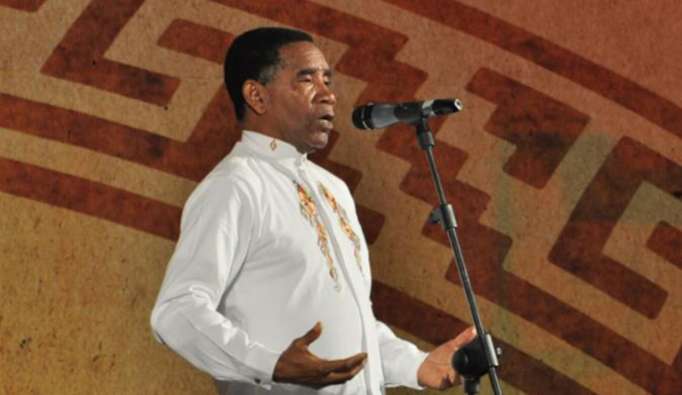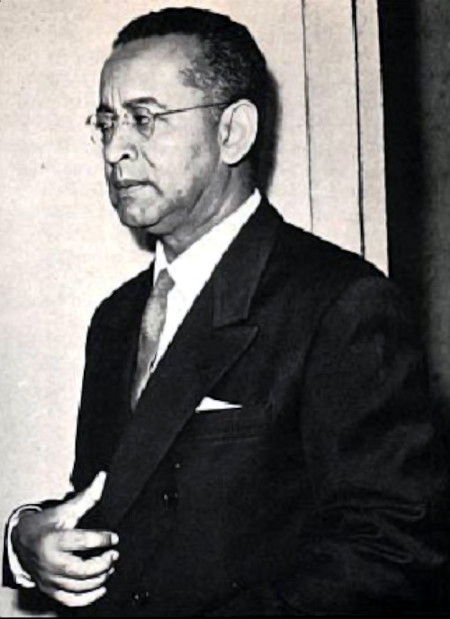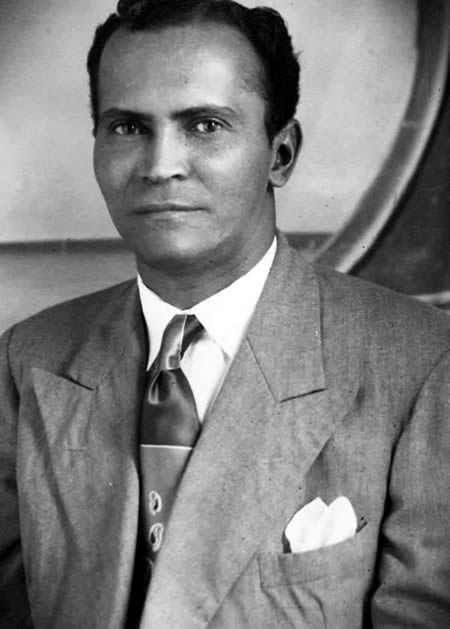Diógenes Cuero Caicedo (Esmeraldas, October 28, 1948 – Ibidem, January 3, 2019) was an Ecuadorian poet, cultural activist, lawyer, university professor, and a prominent voice in celebrating and affirming black identity. Born in the poor black community of San Francisco de Ónzole in the Eloy Alfaro Canton, Cuero dedicated his life to promoting the culture and heritage of Afro-Ecuadorians. His literary journey began in the 1980s, using poetry as a means to explore themes of blackness, social justice, and the rich cultural legacy of his community. Through works like “Tsunami, Mitología y Poesía” and “Las Huellas de la Carimba,” Cuero illuminated the experiences, struggles, and contributions of Afro-Ecuadorians, challenging stereotypes and fostering a deeper understanding and appreciation of black identity. His impact as a poet and cultural advocate continues to resonate, leaving a lasting legacy in Ecuadorian literature. He held a doctorate in Jurisprudence and for 20 years hosted a radio program called “Raíces” (Roots), where he spoke about the culture of his people.
Continue reading “Diógenes Cuero Caicedo”Category: Afro-Ecuadorian writers
Máxima Angulo Borja
Máxima Angulo Borja, born in San Lorenzo, Esmeraldas, is an Ecuadorian poet. Her poetry is deeply rooted in personal experiences and activism, exploring themes of Afro-Ecuadorian identity. In 2018, Angulo published her book “Pininos Literarios” through the House of Ecuadorian Culture of Esmeraldas. This work delves into Afro-Ecuadorian culture, incorporating mythological characters such as La Tunda, El Riviel, and La Gualgura to emphasize their cultural significance. The book also pays tribute to the marimba, a traditional musical instrument in Esmeraldas. Angulo’s writing resonates with readers through its accessible language and vivid descriptions, shedding light on social realities and preserving ancestral customs. Currently residing in Muisne, a coastal town in the southwest of Esmeraldas province in northwestern Ecuador, Máxima Angulo Borja works as a literature and language teacher at Unidad Educativa Muisne.
Continue reading “Máxima Angulo Borja”Orlando Tenorio
Orlando Tenorio Cuero (Esmeraldas, May 22, 1945) is an Afro-Ecuadorian poet and writer. Tenorio’s poetry explores a variety of topics, providing deep observations on social consciousness, struggle, and the human condition. His notable books include “Desde atrás de la vida” [From Behind Life], “El Alfabeto de las golondrinas” [The Swallows’ Alphabet], and “Epistlas para el hombre y el mar” [Epistles to Man and the Sea]. Tenorio also served as president of the Esmeraldas chapter of the House of Ecuadorian Culture (Casa de la Cultura Ecuatoriana), displaying his dedication to fostering arts and culture in his region.
Continue reading “Orlando Tenorio”Yuliana Ortiz Ruano
Yuliana Ortiz Ruano (Limones, Esmeraldas, 1992) is an Ecuadorian poet and writer. She has had several of her poems published in both printed and digital magazines. Among her published poetry books are “Sovoz” (2016), “Canciones desde el fin del mundo” (2018), and “Cuaderno del imposible retorno a Pangea” (2021). In 2017, Yuliana received an honorable mention at the international poetry festival “Poetry in Parallel Zero.” She was also awarded the National Literature Award in 2021 in the poetry category for her remarkable contributions to the field. Currently, she serves as an editor and anthologist for the online poetry magazine Cráneo de Pangea. Yuliana’s debut novel, “Fiebre de carnaval” (Carnival Fever), was published in 2022 and received critical acclaim. In 2023, she won the prestigious IESS First Novel Prize in Italy, which recognizes the best first novel by a Latin American author under the age of 35. As part of this award, her book will be translated into Italian. Her novel was also recognized as one of the recommended books of 2022 by the Spanish edition of Vanity Fair magazine and received high praise from author Mónica Ojeda, who named it her favorite novel of the year. Currently, Yuliana Ortiz Ruano resides in Guayaquil, Ecuador.
Continue reading “Yuliana Ortiz Ruano”Antonio Preciado
Antonio Preciado Bedoya is an Afro-Ecuadorian poet, university professor and diplomat. He was born in Esmeraldas on May 21, 1941. He was director of the Municipal Center of Culture of the city of Esmeraldas and President of the Esmeraldas chapter of the House of Ecuadorian Culture. For 23 years he was director of the Department of Culture of the Central Bank of Ecuador and rector of the University of Esmeraldas. He has been dubbed the “Poet of the Diaspora.” Together with Nelson Estupiñán Bass, Preciado is considered one of the greatest exponents of Esmeralda poetry. Siete veces la vida (1967) is widely regarded as his most famous collection of poems. Some of his work has been translated into English, French and Romanian.
Continue reading “Antonio Preciado”Adalberto Ortiz
Adalberto Ortiz Quiñones (Esmeraldas, February 9, 1914 – Guayaquil, February 1, 2003) was an Afro-Ecuadorian novelist, short story writer, poet, professor and diplomat. Among his most important books are: Juyungo (1942, novel; English translation by Susan Hill and Jonathan Tittler, 1983); Earth, Sound and Drum (1953, poetry); Entundada (1971, short story). His most defining feature as a writer was the incorporation of the elements of afro-Ecuadorian culture, enriching his literary vocabulary with its jargon, its elasticity and its rhythm. In 1995 Ortiz was awarded the Eugenio Espejo Prize, Ecuador’s most important literary award.
Continue reading “Adalberto Ortiz”Nelson Estupiñán Bass
Nelson Estupiñán Bass (Sua, Esmeraldas, September 19, 1912 — Pennsylvania, United States, March 3, 2002) was an Afro-Ecuadorian novelist, short story writer, poet, essayist, journalist and diplomat. He served as the president of the Esmeraldas chapter of the House of Ecuadorian Culture. His first novel Cuando los guayacanes florecían (1954; translated into English as When the Guayacans Were in Bloom, 1987) is widely read in Ecuador and Latin America, and has been translated into English, German, French and Russian. In 1993 Bass received Ecuador’s highest literary honor, the Eugenio Espejo Award. In 1998, Estupiñán Bass was nominated for the Nobel Prize in Literature. While giving a series of lectures in 2002 at Penn State University Bass became ill with pneumonia and succumbed to the deadly illness at the Hershey Medical Center on March 3, 2002
Continue reading “Nelson Estupiñán Bass”Luz Argentina Chiriboga
Luz Argentina Chiriboga Guerrero is an Afro-Ecuadorian poet, novelist and short story writer. She was born in Esmeraldas on April 1, 1940. Her works are concerned with Afro-Hispanic cultural identity and themes about women’s challenges. She is a member of the House of Ecuadorian Culture. Several of her novels have been translated into English, Italian and French.
Continue reading “Luz Argentina Chiriboga”

